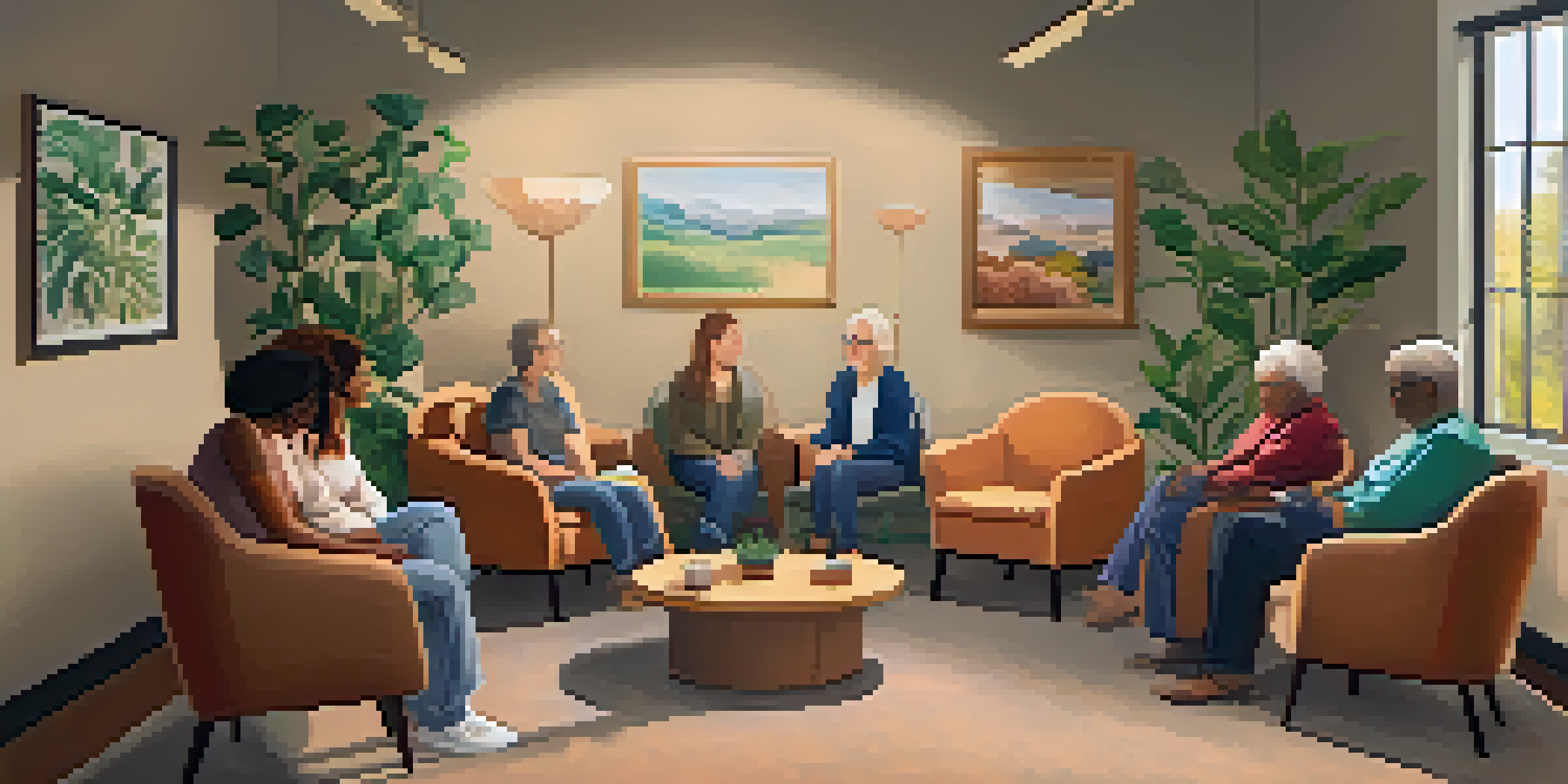Crisis Resources for Mental Health Emergencies in Charlotte

Understanding Mental Health Crises and Their Impact
Mental health crises can feel overwhelming, affecting individuals and families alike. They may arise from various triggers, such as trauma, stress, or sudden life changes, leaving people feeling lost and unsure of where to turn. Understanding these crises is the first step towards finding support and resources that can help.
It's okay to not be okay, but it's not okay to stay that way.
In Charlotte, the community is increasingly aware of the importance of mental health, leading to a variety of resources aimed at providing assistance. Whether it’s someone experiencing anxiety or someone in a more severe crisis, the right help is crucial. Ignoring these feelings can lead to further complications, making access to resources even more essential.
By recognizing the signs of a mental health crisis, such as drastic mood changes or withdrawal from loved ones, individuals can take proactive steps towards getting help. It’s vital to remember that reaching out for support is a sign of strength, not weakness, and there are numerous avenues available in Charlotte to assist those in need.
Crisis Hotlines: Immediate Support at Your Fingertips
Crisis hotlines serve as a lifeline for those in urgent need of mental health support. In Charlotte, the National Suicide Prevention Lifeline at 1-800-273-TALK connects individuals with trained counselors who can provide immediate assistance. These resources are available 24/7, ensuring that help is just a phone call away, no matter the time.

Another valuable resource is the Charlotte Crisis Line, specifically tailored for residents facing mental health emergencies. This line offers local support and can guide individuals to appropriate local services. It’s a reassuring option for those who might feel more comfortable speaking with someone familiar with the community.
Recognizing Mental Health Crises
Understanding the signs of mental health crises is crucial for seeking timely support and resources.
Using a crisis hotline can be a crucial first step in addressing mental health issues, providing both immediate comfort and guidance on what to do next. Remember, you don’t have to face your struggles alone, and these hotlines are here to listen and help without judgment.
Local Mental Health Facilities for In-Person Support
Sometimes, face-to-face interaction is what individuals need most during a mental health crisis. Charlotte is home to several mental health facilities that offer in-person support for those in distress. Facilities like the Mecklenburg County Crisis Services provide comprehensive evaluations and can prescribe treatment if necessary.
The greatest discovery of my generation is that a human being can alter his life by altering his attitude.
These centers often have trained professionals who understand the complexities of mental health struggles. They can offer personalized care tailored to each individual’s needs. In-person support can be particularly beneficial for those who may feel overwhelmed by technology or prefer a more personal connection.
Visiting a mental health facility can be a daunting step, but it’s an important one. Knowing that there are caring professionals ready to help can provide comfort and reassurance, making the journey toward recovery feel more manageable.
Support Groups: Finding Community and Understanding
Support groups can be a powerful resource for individuals experiencing mental health crises. In Charlotte, various organizations offer group sessions where people can share their experiences in a safe and supportive environment. These gatherings foster a sense of community, reminding individuals they are not alone in their struggles.
In these sessions, participants often find that sharing their stories can be healing. It provides an opportunity to connect with others who understand the challenges they face. Many groups are led by trained facilitators who can guide discussions and offer valuable insights.
Crisis Hotlines Provide Immediate Help
Crisis hotlines in Charlotte offer 24/7 access to trained counselors, providing immediate assistance to those in need.
Engaging in a support group can also introduce individuals to coping strategies and resources they may not have considered. The collective strength found in these groups can be incredibly uplifting, empowering participants to take steps toward recovery and healing.
Emergency Services: When Immediate Action is Needed
In critical situations where someone may pose a risk to themselves or others, emergency services are crucial. In Charlotte, dialing 911 is the quickest way to access immediate help from trained professionals. First responders are equipped to handle mental health crises and can provide necessary interventions.
It’s important to remember that calling for emergency services doesn’t mean you have failed; it’s a proactive step toward ensuring safety. Emergency responders can assess the situation and connect individuals to appropriate mental health resources for follow-up care.
Having the courage to call for help can save lives. If you or someone you know is in immediate danger, don’t hesitate to reach out to emergency services. They are there to help and support you through the crisis.
Online Resources: Accessing Help from Home
In today's digital age, online resources for mental health support are more accessible than ever. Websites like NAMI (National Alliance on Mental Illness) offer a wealth of information about mental health issues, coping strategies, and local resources in Charlotte. These platforms can be a great starting point for those seeking help.
Many organizations also provide virtual support groups and counseling options, allowing individuals to connect with professionals from the comfort of their own homes. This can be particularly appealing for those who may feel anxious about in-person visits or simply prefer the convenience of online services.
Long-Term Support is Essential
Establishing a long-term support plan is vital for ongoing recovery and preventing future mental health crises.
Finding support online can empower individuals to take charge of their mental health journey. With a few clicks, you can access a variety of resources designed to guide you through tough times, making help more accessible than ever.
Long-Term Support: Continuing the Journey to Wellness
After a mental health crisis, the journey doesn’t end; it’s just the beginning of a new chapter toward wellness. Establishing a long-term support plan can help individuals stay on track and continue their healing. This might include regular therapy sessions, medication management, or ongoing participation in support groups.
In Charlotte, numerous resources are available to aid in long-term recovery. Mental health professionals can work with individuals to create personalized plans that address their unique needs and challenges. This ongoing support can be instrumental in preventing future crises.

Remember, recovery is a process, and it’s okay to seek help along the way. By embracing long-term support options, individuals can build resilience and lead fulfilling lives, even in the face of mental health challenges.